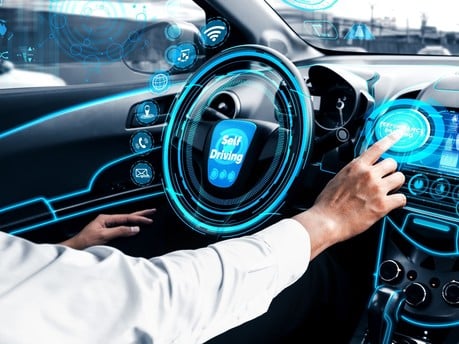Are Self-Driving Cars Safe for UK Roads?
We explore a future with autonomous vehicles
It’s a question on the lips of many motorists here in the UK; would the roads be safer with self-driving cars?
The concept of a self-driving car seems like something out of a space travel novel, but it is a very real future. In summer 2022, it was revealed that the Highway Code had introduced additional rules to facilitate a future of self-driving cars.
Within this dedicated article discussing the subject, here at Wilsons Epsom, we explain more about self-driving cars, when motorists can expect to see them on UK roads, and what problems they may face…
What is a self-driving car?
A self-driving car is also referred to as an autonomous car and is a driverless vehicle which incorporates automation technology in order to function. In essence, a self-driving vehicle will operate with little or no human control and instead uses artificial intelligence (AI) to operate during journeys.
In order to qualify as a fully operational self-driving car, a vehicle must be able to navigate its way from A to B on standard public roads without any human intervention whatsoever. Of course that doesn’t mean human intervention shouldn’t be possible at any point during the journey.
How do self-driving cars work?
Cars that can drive themselves have long been in the pipeline. In the not-too-distant future, fully autonomous cars will be a regular sight on our roads, so now is the time for motorists to understand and adapt to the idea of self-driving cars.
Over the last few years, vehicle manufacturers have been investing a lot of time and money into developing autonomous cars. Designs can vary, but the technology needed for a self-driving car to function is ultimately the same.
The foundation of a driverless vehicle is built upon what’s referred to as an ‘internal map’ of a car’s surroundings. This complex navigation ability is made possible due to a series of ultra-sensitive sensors located all around the vehicle. In-built software has been created to process the information from the sensors in order to plot direction of movement, while additional AI technology ‘speaks’ to the vehicle’s key controls, such as the acceleration, braking and steering systems.
To allow self-driving vehicles to travel safely in volume, manufacturers are investing in technologies which will allow them to become ‘connected’ or ‘synced’ (much like a laptop or iPhone) so that they can communicate between each other and allow for safe travel.

What are the levels of autonomous vehicles?
As vehicle technology develops and our keenness for AI intervention leads to assisting daily driving habits, five levels of varying autonomy have been introduced, so that we as consumers can understand how much cars are developing for the better.
- LEVEL 1: Minor assistance for drivers. Systems are introduced to assist drivers on their daily drive, such as features like cruise control or automatic braking, which they fully operate.
- LEVEL 2: Automation is partly introduced. This means two or more automated systems are present and used for driver assistance, which are monitored and controlled by the driver.
- LEVEL 3: Automation is active under certain conditions. The vehicle has the ability to operate a number of automated systems depending on the environment around it, but can be overridden by human intervention.
- LEVEL 4: Automation has a high presence. Autonomous systems are widely introduced throughout the vehicle and are operational during large parts of journeys, although human override is still possible.
- LEVEL 5: The vehicle is fully automated. This means that the vehicle can operate driverless under all conditions presented to it without any human intervention required.
The Highway Code rules for self-driving cars
As we look to embrace a future of driverless cars, the bible of driving - the Highway Code - has introduced a series of rules relating to autonomous vehicles.
At the moment, these new additions are based on semi-autonomous driving, so that human intervention is still expected to play a vital role in the operation of such a vehicle. Within the revised 2022 version, the Highway Code states the following:
- No handheld devices to be used behind the wheel.
- No sleeping behind the wheel.
- No drink or drugs to be consumed behind the wheel or present within the person in charge of the vehicle.
- Be aware of where you can and can’t drive an autonomous vehicle, as there are currently restrictions in place which are subject to review.
Are drivers allowed to watch TV in self-driving cars?
Alongside the ‘don’ts’ of autonomous driving, the Highway Code has highlighted that as well as the variety of driver assistance technology offered within semi-autonomous vehicles, there is another obvious perk.
This comes in the form of TV consumption - yes, you read that right! According to the Highway Code update in summer 2022, it will be possible for drivers to - in some cases - watch TV as long as it’s consumed via the car’s inbuilt infotainment system. Emails and messages may also be accessed via this in-car platform too.
Why do we need self-driving cars?
Of course all this time and investment by manufacturers is all for good reason. The overall aim of self-driving cars is the safety aspects it can provide. In addition, there are a number of other benefits to a future of autonomous vehicles, including:
- A greater level of road safety with the implementation of AI systems to help reduce the number of road accidents across the country.
- Reducing the risk of dangerous driving by motorists who may be under the influence of drink or drugs.
- Reducing the risk of careless driving by motorists who may be extremely tired, distracted or speeding.
- Providing better independence to those who may be physically or visually impaired and unable to drive a conventionally operated vehicle.
- Saving costs for potential vehicle repairs due to accidents and incidents.
- Saving journey time and congestion as AI technology will detect any potential hazards or risk of delays.
- Environmental benefits as self-driving car technology is being developed for electric vehicles.
When are self-driving cars expected on UK roads?
The government has released its plans for self-driving cars to be introduced to UK roads in the coming years. In an article published in August 2022, it states that British motorists could see self-driving vehicles in use by 2025 thanks to a £100 million investment promised to support the industry and roll out.
Aiming to speed up the production of driverless vehicles, the article also teases that some cars, coaches and lorries with semi-autonomous features may even be present on UK roads as early as 2023 - although these will be restricted to motorway travel only.

What is the biggest problem with self-driving cars?
When it comes to implementing self-driving cars on our roads, it’s not necessarily the acceleration of the technology behind them, or the investment to see it happen, but the practicalities of going fully autonomous.
At present, motorists are very much used to being firmly in the driving seat and with that comes resistance and scepticism about driverless vehicles. Nevertheless, autonomous cars are set to be a very real future, so the concern right now should lie in the infrastructure of a world with self-driving vehicles.
Whether semi or fully driverless, autonomous vehicles are only as good as the technology around them in order to operate safely. It’s not just about other road users and their vehicles; for example, the country’s traffic light system will need to be adapted to allow for this type of on-road technology to function - and that is just one hurdle to overcome.
The entire environment surrounding a self-driving car is of the utmost importance in order for it to safely navigate on any given journey, which means there is so much more than just the vehicles themselves to consider.
Would the roads be safer with self-driving cars?
Of course in the long-run, roads would absolutely become safer in a world of driverless vehicles. For one, the issue of human error and judgement is removed, instead allowing for a system whereby vehicles communicate between themselves to allow free-flow movement from road to road.
As technology advances at a rapid rate, so do the safety features onboard a vehicle, developed to protect the ‘driver’ and their passengers.

Safety first at Wilsons Epsom
At our family-run new and used car supermarket in Epsom, Surrey, we proudly represent 11 new car brands with models boasting the latest in onboard safety technology.
Many new cars are equipped with advanced driver-assistance systems (ADAS) to help make vehicle travel safer, while improving the overall driving experience too. From adaptive cruise control to automatic parking technology, if you’re searching for a car with advanced capabilities, then speak to us about your options.
All of our cars are available to look at via our online showroom, where we boast a huge selection of hybrid and electric vehicles too.



